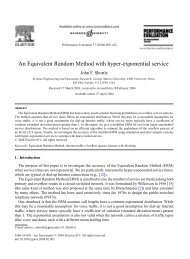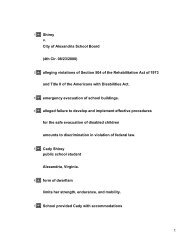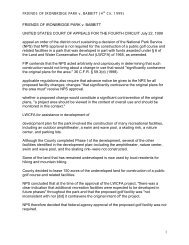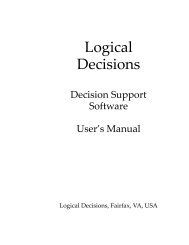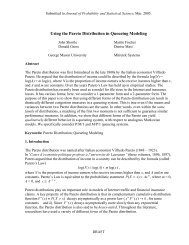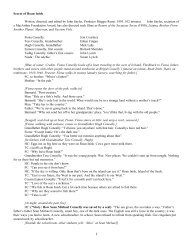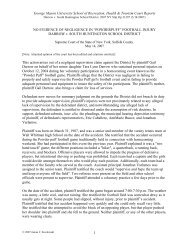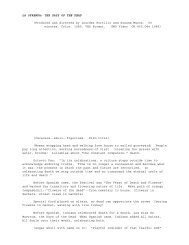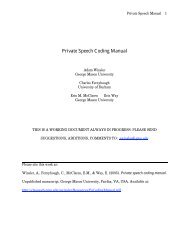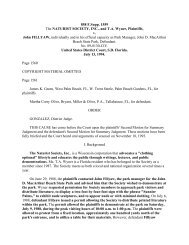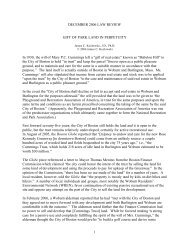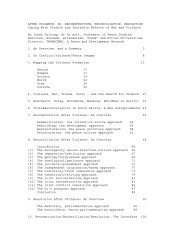A Comparison of Jay Gatsby and Charlie Wales - Classweb
A Comparison of Jay Gatsby and Charlie Wales - Classweb
A Comparison of Jay Gatsby and Charlie Wales - Classweb
Create successful ePaper yourself
Turn your PDF publications into a flip-book with our unique Google optimized e-Paper software.
Anonymous<br />
Exemplary Paper<br />
ENGL 201-036<br />
March 22, 2000<br />
Impractical Lives:<br />
A comparison <strong>of</strong> <strong>Jay</strong> <strong>Gatsby</strong> <strong>and</strong> <strong>Charlie</strong> <strong>Wales</strong><br />
Anonymous / “Impractical Lives” 1<br />
In the novel The Great <strong>Gatsby</strong> <strong>and</strong> short story “Babylon Revisited,” F. Scott Fitzgerald<br />
creates two similar main characters, <strong>Jay</strong> <strong>Gatsby</strong> <strong>and</strong> <strong>Charlie</strong> <strong>Wales</strong>. Both men have an<br />
ideal, unrealistic perception <strong>of</strong> money, people, <strong>and</strong> happiness, which in turn affects the<br />
lives <strong>of</strong> others <strong>and</strong> results in tragedy. <strong>Gatsby</strong> <strong>and</strong> <strong>Charlie</strong> are two hopeless romantics in<br />
search <strong>of</strong> their lost pasts—pasts which unfortunately hurt them.<br />
Both <strong>Gatsby</strong> <strong>and</strong> <strong>Charlie</strong> throw their new money lavishly away in search <strong>of</strong> their<br />
past. Fruiterers, caterers, orchestras, bars, music, lights, <strong>and</strong> laughter furnish <strong>Gatsby</strong>’s<br />
parties every Saturday. It was a carnival for all the uninvited to attend, though the only<br />
person whose attendance was truly desired was his long-lost love, Daisy Buchanan.<br />
Jordan Baker assumes “[<strong>Gatsby</strong>] half expected Daisy to w<strong>and</strong>er into one <strong>of</strong> his parties,<br />
some night” (84). As soon as the search for Daisy is over, <strong>Gatsby</strong> dismisses all his<br />
servants <strong>and</strong> parties, at her unspoken request, <strong>and</strong> this is when Nick realizes that the<br />
money spent on extravagant parties was all an attempt to attract Daisy: “So the whole<br />
caravansary had fallen in like a card house at the disapproval in her eyes” (120).<br />
<strong>Charlie</strong> also wastefully throws his money away, to escape his past <strong>and</strong> to repress<br />
his mistakes:<br />
He remembered thous<strong>and</strong>-franc notes given to an orchestra for playing a<br />
single number, hundred-franc notes tossed to a doorman for calling a cab.<br />
It had been given, even the most wildly squ<strong>and</strong>ered sum, as an <strong>of</strong>fering to<br />
destiny that he might not remember the things most worth remembering,<br />
the things that now he would always remember—his child taken from his<br />
control, his wife escaped to a grave in Vermont (493).<br />
With their unlucky money, both <strong>Gatsby</strong> <strong>and</strong> <strong>Charlie</strong> attempt to regain what they think<br />
will recreate the past <strong>and</strong> make them happy once again. <strong>Gatsby</strong> truly believes that his
Anonymous / “Impractical Lives” 2<br />
wealth will make Daisy drop everything—her life, her husb<strong>and</strong>, her child—<strong>and</strong> that it<br />
will lure her back to him. <strong>Gatsby</strong> buys the West Egg mansion across the bay from<br />
Daisy’s house, the “real” books, the shirts, the ties, the suits, <strong>and</strong> even creates a new self,<br />
all so the Daisy, from five years earlier, will return to him.<br />
<strong>Charlie</strong> also believes that his regained wealth, along with his stability, parental<br />
rights, <strong>and</strong> desire to be a father again, makes him a suitable guardian for his daughter<br />
Honoria. <strong>Charlie</strong> says, “I’m able to give her certain advantages now. I’m going to take<br />
French governess to Prague with me. I’ve got a lease on a new apartment” (499).<br />
Marion, the sister <strong>of</strong> <strong>Charlie</strong>’s dead wife Helen, disagrees: “I suppose you can give her<br />
more luxuries than we can . . . when you were throwing away money we were living<br />
along watching every ten francs . . . I suppose you’ll start doing it again” (499).<br />
<strong>Charlie</strong>’s motives for regaining Honoria have more to do with himself than his<br />
daughter. If the Peters raise Honoria, he feels, she will eventually grow to share their<br />
mistrust <strong>of</strong> him. When <strong>Charlie</strong> is talking to Marion, he is startled by her resentment<br />
towards him:<br />
[With] each remark the force <strong>of</strong> her dislike became more <strong>and</strong> more<br />
apparent. She had built up all her fear <strong>of</strong> life into one wall <strong>and</strong> faced it<br />
toward him. <strong>Charlie</strong> became increasingly alarmed at leaving Honoria in<br />
this atmosphere <strong>of</strong> hostility against himself; sooner or later it would come<br />
out, in a word here, a shake <strong>of</strong> the head there, <strong>and</strong> some <strong>of</strong> that distrust<br />
would be irrevocably implanted in Honoria (498).<br />
<strong>Charlie</strong> does not take into account the benefits <strong>of</strong> Honoria living with the Peters.<br />
Although she would not have all the luxuries that <strong>Charlie</strong> could provide her, she would<br />
have met more important needs such as the stability <strong>of</strong> a successful mother <strong>and</strong> father <strong>and</strong><br />
a healthy, homey atmosphere. The narrator supports this idea when describing the Peters<br />
household:<br />
It was warm here, it was home, people together by a fire. The children felt<br />
very safe <strong>and</strong> important; the mother <strong>and</strong> father were serious, watchful.<br />
They had things to do for the children more important than his visit here.<br />
A spoonful <strong>of</strong> medicine was, after all, more important than the strained<br />
relations between Marion <strong>and</strong> himself (502).
Anonymous / “Impractical Lives” 3<br />
Both <strong>Gatsby</strong> <strong>and</strong> <strong>Charlie</strong> hold very high expectations <strong>of</strong> others. <strong>Gatsby</strong> believes<br />
that his love for Daisy will conquer all practicalities <strong>and</strong> expects her believe this concept<br />
as well, <strong>and</strong> tells Tom in a touch <strong>of</strong> panic, “You’re not going to take care <strong>of</strong> her any<br />
more. Daisy is leaving you” (140). <strong>Gatsby</strong> believes that the love between Daisy <strong>and</strong> him<br />
is all that is needed to be happy. He does not consider how stressful a divorce or custody<br />
fight can be, <strong>and</strong> expects her to leave everything—her whole life, everything she has<br />
worked for, just because she loves him.<br />
<strong>Charlie</strong> believes <strong>and</strong> trusts in the value <strong>of</strong> character, that character is all that a<br />
person needs to possess. <strong>Charlie</strong> is afraid Honoria may have lost her character amongst<br />
the unstable relationship between Helen <strong>and</strong> him. He will be happy, even if Honoria is<br />
not, because he will have the responsibility to develop her character. <strong>Charlie</strong> feels that if<br />
he can raise his daughter successfully, he will not have to feel the guilt <strong>of</strong> his wife’s<br />
death:<br />
At dinner he couldn’t decide whether Honoria was most like him or her<br />
mother. Fortunate if she didn’t combine the traits <strong>of</strong> both that had brought<br />
them to disaster. A great wave <strong>of</strong> protectiveness went over him. He<br />
thought he knew what to do for her. He believed in character; he wanted<br />
to jump back a whole generation <strong>and</strong> trust in character again as the<br />
eternally valuable element. (493).<br />
Both men persist with their quests until the very end. <strong>Gatsby</strong> waits by Daisy’s<br />
window in an attempt to protect her from Tom, <strong>and</strong> says he “doesn’t trust him [Tom]”<br />
<strong>and</strong> that he will “wait all night if necessary” (152). Even after all the commotion, <strong>Gatsby</strong><br />
hopelessly waits to see if Daisy will come out to see him, <strong>and</strong> perhaps even leave Tom.<br />
Even after Tom <strong>and</strong> Daisy have left town together, as Nick departs from Long Isl<strong>and</strong>,<br />
<strong>Gatsby</strong> does not accept that everything is over between he <strong>and</strong> Daisy, saying, “I suppose<br />
Daisy’ll call too” (161).<br />
<strong>Charlie</strong> also believes, until the very end, that there is still a chance that Marion<br />
will give him custody <strong>of</strong> Honoria. <strong>Charlie</strong> makes one last desperate attempt, just as<br />
<strong>Gatsby</strong> awaits Daisy’s call, <strong>and</strong> calls the Peters to see if Marion has changed her mind.<br />
As <strong>Charlie</strong> says to Lincoln Peters, “I called up because this thing is on my mind. Has<br />
Marion said anything definite?” (505).
Anonymous / “Impractical Lives” 4<br />
Both <strong>Gatsby</strong> <strong>and</strong> <strong>Charlie</strong> find that their pasts come back to hurt them. All the<br />
rumors about <strong>Gatsby</strong> being a bootlegger, a gambler, having killed a man, <strong>and</strong> working<br />
Wolfsheim remain mysteries to almost everyone in the story, <strong>and</strong> another such “rumor”<br />
gets him killed in the end. Because Tom despises <strong>Gatsby</strong> <strong>and</strong> thinks he is such a<br />
criminal, he tells George Wilson who he thinks was driving the car that killed Myrtle—<br />
<strong>and</strong> thus he frames <strong>Gatsby</strong>. In the end, Mr. Wilson holds <strong>Gatsby</strong> responsible for Mrytle’s<br />
death, <strong>and</strong> murders him. Likewise, <strong>Charlie</strong>’s past as a spendthrift <strong>and</strong> alcoholic does not<br />
help determine Marion’s decision, for she holds <strong>Charlie</strong> responsible for Helen’s death<br />
<strong>and</strong> keeps custody over Honoria.<br />
<strong>Gatsby</strong> <strong>and</strong> <strong>Charlie</strong> both wish they could live in the past. <strong>Gatsby</strong> <strong>and</strong> <strong>Charlie</strong> are<br />
left with huge disappointments, because they expected to gain love, money <strong>and</strong> their<br />
pasts so easily. Neither can accept the changes in his life. <strong>Gatsby</strong> <strong>and</strong> <strong>Charlie</strong> did not<br />
consider the practicalities <strong>of</strong> what they wanted, <strong>and</strong> focused only on what they envisioned<br />
would recreate the past, <strong>and</strong> recreate their happiness.



